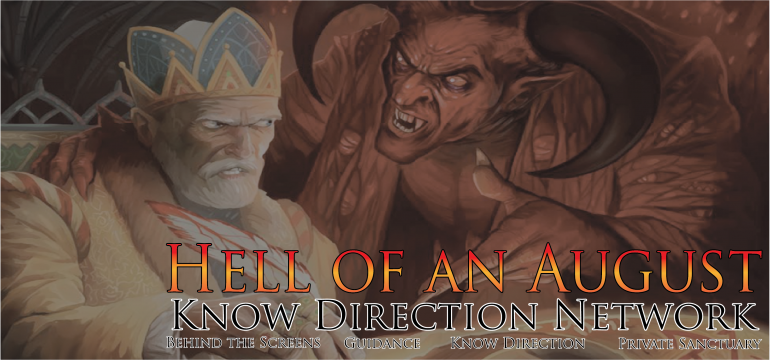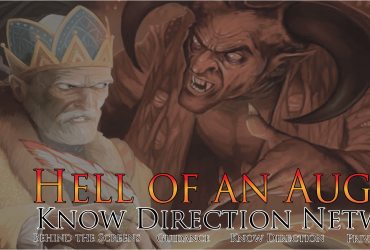Welcome to Guidance, Private Sanctuary’s source for tips and techniques for the Pathfinder Roleplaying Game, written by Everyman Gamer Alexander Augunas. Today, we’re going to be talking about roleplaying Lawful Evil characters.
Ah, Evil. More and more, it seems like Evil is the more popular option for players. At least, a vocal minority of players, anyway. Its difficult to say why “playing bad” is so popular. Some players like the idea of having one less string for the GM to play in regards to what they can and cannot do in the contex of the game world. Others want to escape from the dominantly Good (or Lawful, at least) expectations of the real world when they game. Others just want to set an imaginary world on fire. Whatever the reason, players wanting to be bad is always going to be a think in roleplaying games, and when and how you should allow players to indulge on the darker side of the human spirit is not the scope of this article.
You see, chances are that if you found your way to this article, chances are you’re a player looking to play a specific type of evil. Lawful Evil. GMs everywhere, rejoice, because Lawful Evil is the absolute best kind of Evil to have in your party, especially if your party is predominately not evil themselves. Now, why am I saying this? Excellent question, but before we jump into answering that question, let’s do a brief dissection on what Lawful Evil is.
Evil with Purpose
Evil with Purpose. I want you to remember that as we move through the article. Now, this isn’t to say that Neutral or Chaotic Evil characters can’t have goals. They do; that’s a simple fact of being sentient. If you’re human-level intelligence or above, you have goals. Whether they’re as simple as satisfying some horrible urge or simply causing as much pain or misery as possible, all types of evil has goals and all types of evil can have reasons to want to work together.
So what makes Lawful Evil different? Well, in all of its flavors, Evil is about self-gratification without conscious, without concern for other people. That’s what separates neutrality from evil; a Neutral character has a conscious, but doesn’t go out of her way to do good like a Good character does. If an Evil character has a sense of right and wrong (which sometimes they don’t), she either ignores it or justifies it as part of some “greater good.” That’s what’s so funny about the term, “greater good,” in my opinion. If something’s for the “greater good,” chances are that its actually sitting somewhere on the neutral/evil side of morality, but I digress.
Now, being so abhorrently self-satisfying alone isn’t what makes Evil characters difficult to play with in a non-Evil party; it’s the limits of that self-satisfying nature that determines how easy it is to slip the character into the party. The “flavor of Evil,” so to speak. You see, a Chaotic Evil character has no limitations. There’s no point where that character says, “I need to stop.” The Chaotic Evil character takes whatever she is strong enough to take with complete disregard to order or rules. And while that sounds bad, the Neutral Evil character is actually a lot worse for a party. You can count on the Chaotic Evil character to be Chaotic and Evil, you can count on her to do what she wants. But the Neutral Evil character is almost impossible to figure out because she lives for one thing and one thing only: sinful self interest.
So, where does this leave Lawful Evil? Lawful Evil has a hierarchy and it knows its place in that hierarchy. It is willing to work with just about anyone to fulfill its goals, and even if those goals are self-fulfilling Lawful Evil is willing to plan and wait for the long-term reward. This is where Lawful Evil beats out Neutral or Chaotic Evil.
Lawful Evil is Patient. And it is this patience that allows Lawful Evil to work ever so well in a group.
Playing Lawful Evil
More often then not, a Lawful Evil character isn’t one that’s going to be running around backstabbing party members; that’s Chaotic or Neutral Evil. The Lawful Evil character might not like every person in the party, but as long as that person is useful to her ultimate goals, the Lawful Evil character knows how to do deal with said annoyance in ways that Neutral or Chaotic Evil cannot. As a result, Lawful Evil has the ability to play nice in just about every party it comes across, and this is what is so important about playing a Lawful Evil character: if you can’t find a reason to work with the party, then you’re not playing Pathfinder. End of discussion.
Typically when you play a Lawful Evil character, you give your character a goal. A rather large goal, one that is often tied to self-satisfaction such as the acquisition of wealth or power. Next, you grab the player’s guide to whatever game you’re playing in (or talk to your GM; that works too) and figure out what the ultimate “goal” of the adventure seems to be and figure out a way how the good guys achieving the adventure’s goal also helps your character achieve her goal. Remember, this can be abstract, ridiculously planned out, or extremely long-term; Lawful Evil characters live for their planning, and that what makes them so much fun to play and to have at the table.
Now, other players are bound to slight you. Should they (or an NPC, for that matter), write down the slight somewhere in your notes and start thinking of ways or situations that you could repay the slight in; the better payoff for you, the better. Before saying something easy like, “killing them in their sleep,” think to your self: 1) “Are they truly more useful to me dead than alive,” and 2) “Can I come up with a better punishment than death?” Because isn’t humiliating your ally, asserting your dominance over him, and ultimately moving yourself up in rank because of your misdeeds more satisfying than just killing a player and causing a serious problem at the game table?
Lawful Evil Anecdote
Before I close out, allow me to share a brief anecdote about the only Lawful Evil character I’ve ever had at my table. The character belonged to my friend Justin, whom some of you may have seen pictures of in my GenCon 2015 stock. Justin played a Lawful Evil elven alchemist named Shuriel in one of my games. (This is the same Shuriel who has a 24+ page in-character backstory for those keeping tabs on my anecdotes.) Shuriel was everything that my then-players DIDN’T expect Evil to be: quite, helpful, and productive. As a matter of fact, during downtime he spent a significant amount of time brewing and selling potions, which none of the PCs realized until one day, after lamenting about how they were one month away from building their fledgling town’s Cathedral, Shuriel revealed that he had over 20,000 gp in potion sales and was more than willing to foot the bill for the building. All of the Neutral characters cheered! Their Cathedral’s construction was expedited, and some even said that Shuriel might need to change his character sheet from Lawful Evil to Lawful Neutral.
But no one ever questioned why Shuriel paid that bill.
Then, no one ever questioned why Shuriel would want the deed for an old, run-down slum that while being the hometown of another PC, had fallen into disrepair and whose population was being relocated to the new town the PCs were building. No one, not even the NPCs, questioned when Shuriel announced his plans to level the ramshackle village to build himself a private vista using his own coin, complete with a private alchemical laboratory that just so happened to be located a stone’s throw from the former laboratory of an evil lich that the party had cleared out of cultists. And when he asked for a monthly stipend to fund his private research, away from the PCs and their village, in order to “better serve the community,” again, no one batted an eye. Especially when he reminded the other PCs of their 20,000 gp debt to him (plus interest).
That’s how Lawful Evil works. It starts small. It may even be helpful. But it is opportunistic and always looking for ways to promote its own goals. Eventually, Shuriel bought out every other alchemist in the region and had them working for him on his experiments. And to this day no one, myself included, truly knows what Shuriel’s plans were (that game ended prematurely when one of the main players had a major lifestyle upheveal), you can bet that whatever they were, he got the entire party to buy into them like horses following a sugar cube. And that’s why Lawful Evil is the best Evil alignment to play: Chaotic Evil and Neutral Evil are acidic, but Lawful Evil is sugary with a nasty, nasty aftertaste.
Alexander “Alex” Augunas has been playing roleplaying games since 2007, which isn’t nearly as long as 90% of his colleagues. Alexander is an active freelancer for the Pathfinder Roleplaying Game and is best known as the author of the Pact Magic Unbound series by Radiance House. Alex is the owner of Everyman Gaming, LLC and is often stylized as the Everyman Gamer in honor of Guidance’s original home. Alex also cohosts the Private Sanctuary Podcast, along with fellow blogger Anthony Li, and you can follow their exploits on Facebook in the 3.5 Private Sanctuary Group, or on Alex’s Twitter, @AlJAug.






Leave a Reply